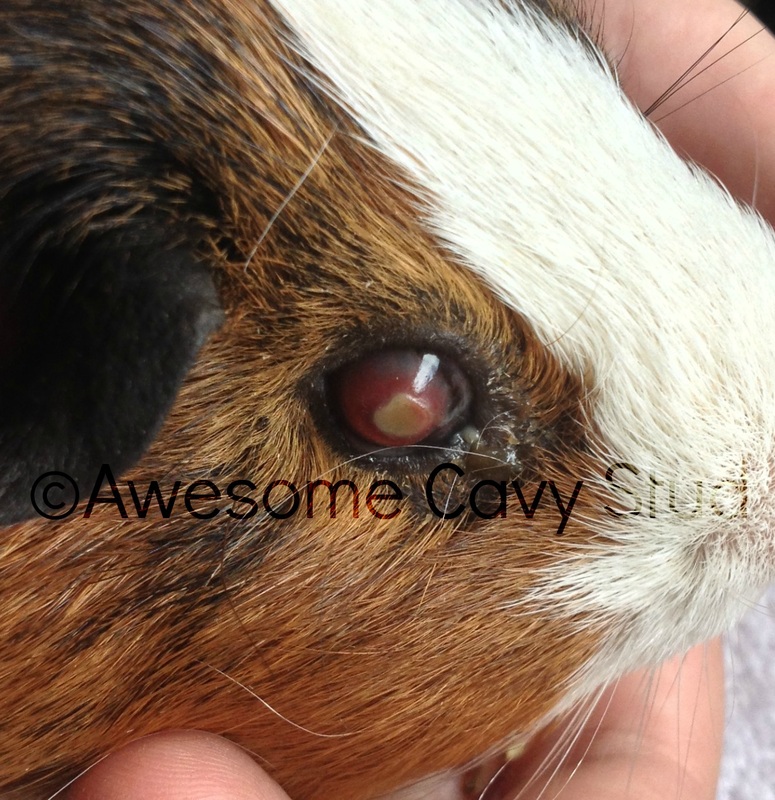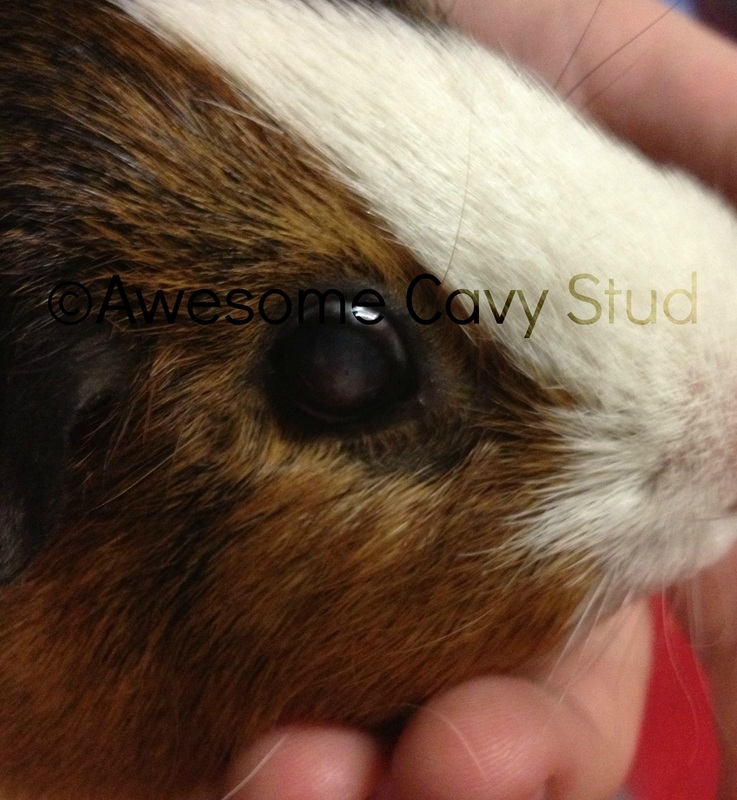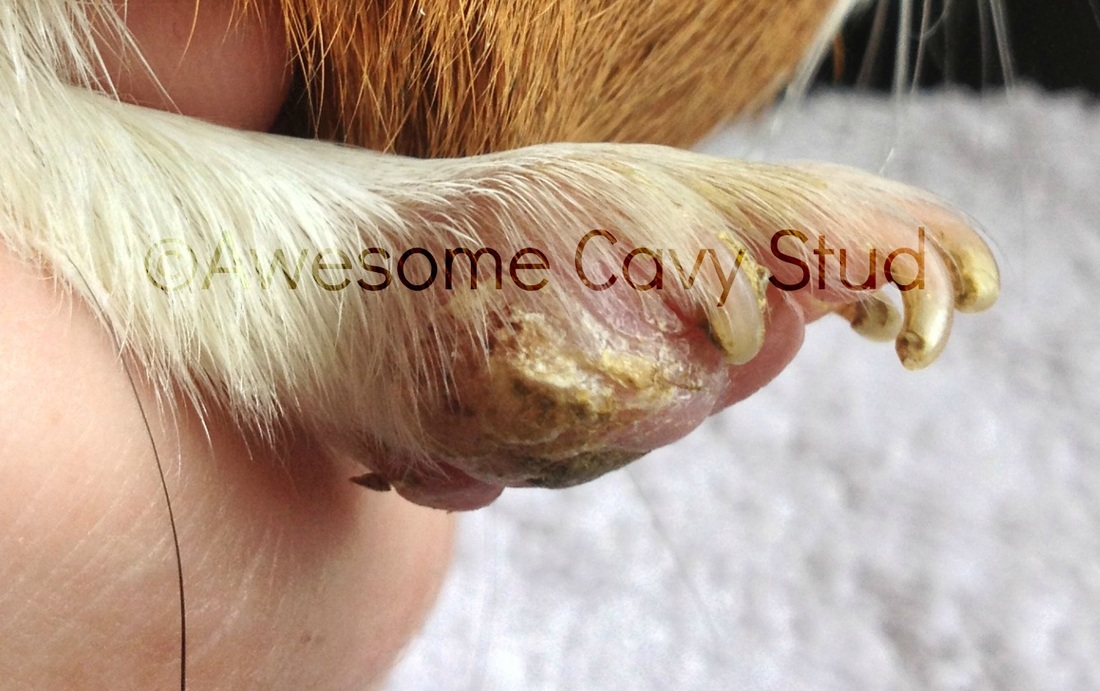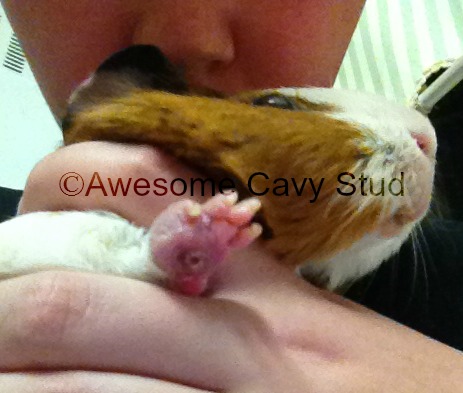Health Issues
I am not a Vet (I am taking an Introduction to Animal Nursing course and plan to become a Vet Nurse in the near future). That said, I know a few things about cavy care and have collected everything I can think of that could be helpful and put it here.
The cavy is a prey animal. This means that they hide signs of illness, so as not to be singled out by predators. Sadly, this makes it very hard to know when they are sick. If fed well, treated well and housed safely, there is no real reason a cavy should become poorly. That said, all animals age and can get sick. If you think a cavy is sick, get it to an exotics vet asap. Regular vets are rarely trained in cavy care and won’t always know what to do. It is important to note a few common problems that can be treated without the aid of a vet. If a vet is required, only see an exotics vet. All vets are trained on how to treat dogs and cats, but only an exotics vet is taught how to properly deal with animals like cavies, chinchillas, rare parrots/birds and other animals not commonly kept as pets. My vet has just moved to Sydney, so I am looking for a new vet trained in cavy care and treatment. As for things you can treat at home, here are some:
· Eye issues – these ALWAYS look worse than they are and are almost always easily fixed. A vet is likely to say it should be removed – but I have never seen (or heard of) a case where this NEEDED to be done. I have personally nursed cavies with very nasty looking eye problems and now they have perfect (well, as good as they did before) vision. It is usually a case of irritation. Check that there is nothing in the eye (dust, grass seeds, etc) clean it out with saline (much cleaner than water and very cheap from Woolworths or a chemist) and apply an eye drop. I use human eye drops for irritated eyes from my local chemists. As long as they are only an artificial tear and don’t contain any harsh chemicals, they are completely safe.
The cavy is a prey animal. This means that they hide signs of illness, so as not to be singled out by predators. Sadly, this makes it very hard to know when they are sick. If fed well, treated well and housed safely, there is no real reason a cavy should become poorly. That said, all animals age and can get sick. If you think a cavy is sick, get it to an exotics vet asap. Regular vets are rarely trained in cavy care and won’t always know what to do. It is important to note a few common problems that can be treated without the aid of a vet. If a vet is required, only see an exotics vet. All vets are trained on how to treat dogs and cats, but only an exotics vet is taught how to properly deal with animals like cavies, chinchillas, rare parrots/birds and other animals not commonly kept as pets. My vet has just moved to Sydney, so I am looking for a new vet trained in cavy care and treatment. As for things you can treat at home, here are some:
· Eye issues – these ALWAYS look worse than they are and are almost always easily fixed. A vet is likely to say it should be removed – but I have never seen (or heard of) a case where this NEEDED to be done. I have personally nursed cavies with very nasty looking eye problems and now they have perfect (well, as good as they did before) vision. It is usually a case of irritation. Check that there is nothing in the eye (dust, grass seeds, etc) clean it out with saline (much cleaner than water and very cheap from Woolworths or a chemist) and apply an eye drop. I use human eye drops for irritated eyes from my local chemists. As long as they are only an artificial tear and don’t contain any harsh chemicals, they are completely safe.
Above is my beautiful rescue sow Muffin. When I took her in, she had a fairly severe eye infection and Bumblefoot. This was no fault of the previous owner. Most of the time, these things occur because the owner isn't properly informed on cavy care. When purchasing from poor sources, pet stores or even popular shelters with untrained carers, these things are usually not mentioned. This particular sow damaged her eye because of the mass amounts of straw bedding in her hutch. I am firmly behind wood shavings as bedding - they are safe, they absorb scent and moisture, and are fairly cheap.
Muffin's eye was very swollen, red and sore. She was agitated and didn't like to be touched. Below is Muffin's eye after just a week of eye drops. She is gaining condition daily and will regain full sight in another week, by my estimate. Anyone is capable of curing an eye infection. Don't remove an eye - they can be saved :)
Muffin's eye was very swollen, red and sore. She was agitated and didn't like to be touched. Below is Muffin's eye after just a week of eye drops. She is gaining condition daily and will regain full sight in another week, by my estimate. Anyone is capable of curing an eye infection. Don't remove an eye - they can be saved :)
· Paw issues – Common with poor bedding. Bumblefoot and fungal infections are difficult and time consuming to treat, but with patience and the right equipment any cavy can be cured. Below is an image of Muffin's paw when I first took her in.
Bumblefoot takes roughly a month to cure. As you can see in the above image, Muffin's paw is inflamed/swollen, scabbed over and very sensitive. She has trouble walking and just hobbles around. Every night I soak her paw in 1cm of Peroxide, wash it off with saline and put her in her own hutch with a clean, soft towel bedding. This is less of an irritant than the shavings I use, which will be fine for her after the Bumblefoot is cured. Fleece bedding is also ideal for cavies experiencing sore/inflamed paws.
When treating paw issues, be sure the soft bedding is always clean and there aren't any hard or sharp items close. Monitor them and treat daily. Below is Muffin's paw after a week of treatment. It is still nowhere near cured, but with a few more weeks she should be fine again. Most of the scabbing has fallen away and there is minor shrinkage in the swelling.
When treating paw issues, be sure the soft bedding is always clean and there aren't any hard or sharp items close. Monitor them and treat daily. Below is Muffin's paw after a week of treatment. It is still nowhere near cured, but with a few more weeks she should be fine again. Most of the scabbing has fallen away and there is minor shrinkage in the swelling.
· Weight issues – A healthy cavy weight varies on age, gender, breed, etc. Here is a good idea of healthy show weights from an experienced, highly regarded breeder/exhibitor on the ANCFOC.org website.
"Newborns under the weight of 60 grams very rarely survive, babies over 130 -150 grams are at risk of being stillborn - even if present at the birth and you are able to help ease these huge babies out - they often don't make it."
***
Newborn 80-100
1 week 150-170
2 weeks 220-250
3 weeks 300-350
4 weeks 350-400
6 weeks 400-500
3 months 600-700
Adult sow (show condition) 900-1300
Adult boar (show condition) 1200-1600
***
Most of my non-papered/pet cavies are less than the above adult weights. A pet adult sow should weight no less than 700 grams and no more than 1400 grams. A pet adult boar should be no less than 800 grams and no more than 1800 grams. Any less than minimum or more than maximum could indicate a weight issue which may mean any number of things. Any weight loss can mean a problem - monitor the weight of all cavies under your care on a weekly basis. A good set of kitchen scales can be bought just about everywhere. Mine cost $8 from K Mart. You should write down specific weights of all cavies, when weighed, if weight is higher/lower.
Eg. Mr. Ponchos (cavy name) M (male) 0.988 grams (weight) > (gain since previous weigh)
· Social issues – A cavy may sometimes regress and become anti-social. Fighting, hiding too often, sitting and staring into corners of the hutch for long periods of time are all dangerous signs that something may be wrong. If you aren't sure, take them to your exotics vet. It is very important to monitor a cavy showing anti-social behaviour and act as soon as possible.
· Heat exhaustion – The weather in Australia is unreliable at best. Cavies are very sensitive to changes in temperature, and many are known to die quickly, even young and in the peak of health, due to one or two hot days. On days over 30 degrees, cavies must be in shade (ideally indoors) and be provided ice bottles. On days over 35, I suggest they MUST be indoors with ice bottles, a fan and/or air conditioner. Keep a very close eye on them and be sure they have plenty of water. If they seem hot and are lounging out or panting, dip them in cool water - not covering the face or nose (not too cold or they could go into shock) and monitor them for any change. If they show signs of heat stroke, take them to a vet asap. Even a regular vet will give them good aid for heat related problems eg. saline drip/ice packs. The best way to avoid death/illness from heat is to keep your cavies indoors at all times. Australia doesn't usually deal with dangerously cold weather, but a cavy shouldn't be outside on days under 10 degrees. A warm blanket, snuggle pouches, a covered hot water bottle and plenty of thick layers of newspaper as insulation are all wonderful ways to keep a cavy warm.
· Poison – There are so many ways a cavy can get sick because of external poisons. It is important to be sure they aren't given any foods they cannot eat, or put near dangerous items. One very common and very sad issue with outdoor cavies is rat poison. People don't think it will do the cavies any harm - it's not going in their hutch, right? Wrong! Rats will eat the poison and carry it with them into the hutches to drink and eat, thus leaving poison behind. Any sick animal can infect a cavy if they're close enough to lick the bars. Sometimes, even the kind of washing liquid used on a bowl/water bottle can be toxic and lethal. I personally only use boiling water to clean my cavy furniture. Weed killers and sprays are a huge danger, too. If grass is collected from a public area there is a good chance it has been sprayed. Be sure to wash all veggies as they can carry pesticides that can harm or kill your pets. Sadly, they are much more sensitive than us and the smallest thing can kill them.
· Anything else – If unsure, see your vet. Cavies can get sick and die very quickly. If you spend enough time with them, noting their natural behaviours and mannerisms, it is easy to detect when they are acting out of the ordinary. There are a lot of sites with misleading/poorly written information. Many years ago before I knew what I know today, I tried to find information online and lost several cavies. Thankfully I've done this for long enough now that I usually know as soon as anything is wrong with one of my cavies. Still, it took many years and without my vet I might not have any cavies today.
"Newborns under the weight of 60 grams very rarely survive, babies over 130 -150 grams are at risk of being stillborn - even if present at the birth and you are able to help ease these huge babies out - they often don't make it."
***
Newborn 80-100
1 week 150-170
2 weeks 220-250
3 weeks 300-350
4 weeks 350-400
6 weeks 400-500
3 months 600-700
Adult sow (show condition) 900-1300
Adult boar (show condition) 1200-1600
***
Most of my non-papered/pet cavies are less than the above adult weights. A pet adult sow should weight no less than 700 grams and no more than 1400 grams. A pet adult boar should be no less than 800 grams and no more than 1800 grams. Any less than minimum or more than maximum could indicate a weight issue which may mean any number of things. Any weight loss can mean a problem - monitor the weight of all cavies under your care on a weekly basis. A good set of kitchen scales can be bought just about everywhere. Mine cost $8 from K Mart. You should write down specific weights of all cavies, when weighed, if weight is higher/lower.
Eg. Mr. Ponchos (cavy name) M (male) 0.988 grams (weight) > (gain since previous weigh)
· Social issues – A cavy may sometimes regress and become anti-social. Fighting, hiding too often, sitting and staring into corners of the hutch for long periods of time are all dangerous signs that something may be wrong. If you aren't sure, take them to your exotics vet. It is very important to monitor a cavy showing anti-social behaviour and act as soon as possible.
· Heat exhaustion – The weather in Australia is unreliable at best. Cavies are very sensitive to changes in temperature, and many are known to die quickly, even young and in the peak of health, due to one or two hot days. On days over 30 degrees, cavies must be in shade (ideally indoors) and be provided ice bottles. On days over 35, I suggest they MUST be indoors with ice bottles, a fan and/or air conditioner. Keep a very close eye on them and be sure they have plenty of water. If they seem hot and are lounging out or panting, dip them in cool water - not covering the face or nose (not too cold or they could go into shock) and monitor them for any change. If they show signs of heat stroke, take them to a vet asap. Even a regular vet will give them good aid for heat related problems eg. saline drip/ice packs. The best way to avoid death/illness from heat is to keep your cavies indoors at all times. Australia doesn't usually deal with dangerously cold weather, but a cavy shouldn't be outside on days under 10 degrees. A warm blanket, snuggle pouches, a covered hot water bottle and plenty of thick layers of newspaper as insulation are all wonderful ways to keep a cavy warm.
· Poison – There are so many ways a cavy can get sick because of external poisons. It is important to be sure they aren't given any foods they cannot eat, or put near dangerous items. One very common and very sad issue with outdoor cavies is rat poison. People don't think it will do the cavies any harm - it's not going in their hutch, right? Wrong! Rats will eat the poison and carry it with them into the hutches to drink and eat, thus leaving poison behind. Any sick animal can infect a cavy if they're close enough to lick the bars. Sometimes, even the kind of washing liquid used on a bowl/water bottle can be toxic and lethal. I personally only use boiling water to clean my cavy furniture. Weed killers and sprays are a huge danger, too. If grass is collected from a public area there is a good chance it has been sprayed. Be sure to wash all veggies as they can carry pesticides that can harm or kill your pets. Sadly, they are much more sensitive than us and the smallest thing can kill them.
· Anything else – If unsure, see your vet. Cavies can get sick and die very quickly. If you spend enough time with them, noting their natural behaviours and mannerisms, it is easy to detect when they are acting out of the ordinary. There are a lot of sites with misleading/poorly written information. Many years ago before I knew what I know today, I tried to find information online and lost several cavies. Thankfully I've done this for long enough now that I usually know as soon as anything is wrong with one of my cavies. Still, it took many years and without my vet I might not have any cavies today.




